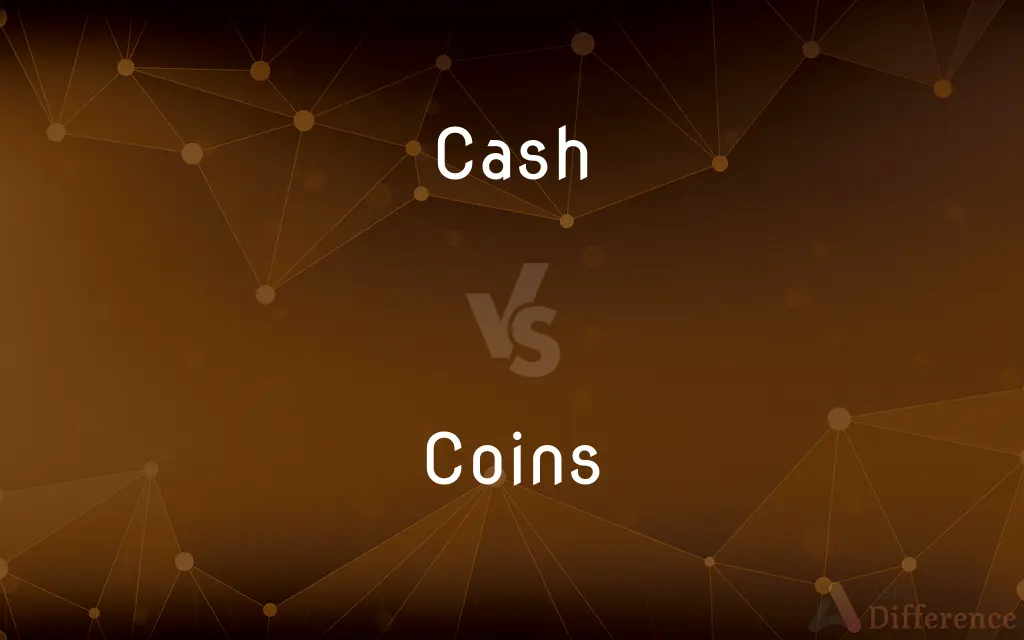Cash vs. Coins — What's the Difference?
Edited by Tayyaba Rehman — By Fiza Rafique — Published on March 29, 2024
Cash generally refers to all physical currency, including banknotes and coins, used for transactions, while coins specifically denote metallic forms of money, often of lesser value than banknotes.

Difference Between Cash and Coins
Table of Contents
ADVERTISEMENT
Key Differences
Cash encompasses both banknotes and coins, serving as a physical means of transaction. It represents government-issued currency that facilitates trade and commerce. On the other hand, coins are a specific type of cash made from metal, characterized by their durability and typically lower value denominations than paper banknotes.
Cash is valued for its wide acceptance in transactions, offering a direct and immediate form of payment. It includes various denominations to suit different scales of trade. Whereas coins, due to their material and manufacturing process, are more costly to produce relative to their face value, especially in the case of lower denominations.
The flexibility of cash allows for its use in a broad range of transactions, from small everyday purchases to larger payments where accepted. Conversely, coins are often used for smaller transactions, acting as change for cash payments or for the use in vending machines and parking meters.
In terms of storage and transportation, cash, particularly in the form of banknotes, is more convenient and lightweight. Whereas coins, being bulkier and heavier, pose challenges in large quantities, affecting their portability and storage.
The design and production of cash, especially banknotes, incorporate advanced security features to prevent counterfeiting. These features include watermarks, security threads, and holograms. Coins, while also featuring distinct designs and sometimes security elements, rely more on their material composition and intricate designs to deter counterfeiting.
ADVERTISEMENT
Comparison Chart
Composition
Includes banknotes and coins
Metallic, made of copper, nickel, etc.
Denomination
Higher and lower values available
Typically lower denominations
Use in Transactions
Broadly accepted for various payments
Primarily for small transactions and change
Portability
Lightweight, easier to transport
Bulkier and heavier
Production Cost
Lower for banknotes, higher for coins relative to face value
Higher due to material and minting process
Compare with Definitions
Cash
A means of payment that involves no electronic transactions.
The festival vendors only accept cash payments.
Coins
Pieces of metal issued by governmental authority as money.
She collected coins from each country she visited.
Cash
Readily accessible money or assets convertible to immediate payment.
He keeps extra cash at home for emergencies.
Coins
Metal currency used primarily for lower-value transactions.
He used coins to pay for the parking meter.
Cash
Legal tender or currency in physical form such as banknotes and coins.
She paid for the groceries entirely in cash.
Coins
Physical form of money, less valued than banknotes but crucial for exact change.
She emptied her purse of coins at the end of the day.
Cash
Money in hand as opposed to bank deposits.
Their cash balance was sufficient for the small purchase.
Coins
Durable, small change pieces often featuring national symbols.
The commemorative coins were released by the mint.
Cash
A resource for immediate use in transactions or payments.
They withdrew cash from the ATM for the trip.
Coins
Collectible items for numismatists, varying in material, era, and rarity.
His coin collection includes rare pieces from the ancient world.
Cash
Money in the form of bills or coins; currency.
Coins
A small piece of metal, usually flat and circular, authorized by a government for use as money.
Cash
To exchange for or convert into ready money
Cash a check.
Cash in one's gambling chips.
Coins
Metal money considered as a whole.
Cash
(uncountable) Money in the form of notes/bills and coins, as opposed to cheques/checks or electronic transactions.
After you bounced those checks last time, they want to be paid in cash.
Coins
A flat circular piece or object felt to resemble metal money
A pizza topped with coins of pepperoni.
Cash
Ready money; especially, coin or specie; but also applied to bank notes, drafts, bonds, or any paper easily convertible into money
Coins
Requiring one or more pieces of metal money for operation
A coin washing machine.
Cash
Prompt payment for goods or services in currency or by check
Coins
Plural of coin
Common Curiosities
What is cash?
Cash refers to physical currency, including both banknotes and coins, used for transactions.
How do cash and coins differ in terms of usage?
Cash is used broadly for all types of transactions, while coins are often used for smaller transactions or as change.
Why are coins heavier than banknotes?
The material composition of coins, being metallic, makes them heavier than paper or polymer banknotes.
What's the significance of coins in history?
Coins have been used for millennia and are significant for their durability, historical value, and role in trade.
Are coins considered cash?
Yes, coins are a form of cash, specifically the metallic portion of physical currency.
Can coins be made of any metal?
Coins are typically made from metals like copper, nickel, and sometimes precious metals for commemorative purposes.
How are new coin designs chosen?
New coin designs are often chosen through national mints, sometimes involving public input or commemorating significant events.
What are coins?
Coins are metallic currency, typically of lower value than banknotes, used for transactions.
Is it more expensive to produce coins or banknotes?
Producing coins can be more expensive than banknotes due to the cost of materials and minting processes.
Do both cash and coins have anti-counterfeiting features?
Yes, both include security features, with banknotes having more advanced anti-counterfeiting technologies.
Is cash still relevant in today's digital age?
Despite the rise of digital payments, cash, including coins, remains relevant for its immediacy and widespread acceptance.
Are there any legal restrictions on using cash or coins?
Legal restrictions can apply, such as limits on cash transactions or the acceptance of large quantities of coins.
Can I only use coins for small purchases?
While typically used for smaller transactions, coins can be used in any transaction where they are accepted.
How do I know if a coin is valuable?
The value of a coin can be determined by its rarity, historical significance, and condition, among other factors.
Why might someone prefer cash to electronic payments?
Preferences for cash include anonymity, ease of use, and avoiding electronic transaction fees.
Share Your Discovery

Previous Comparison
Method Overloading vs. Method Overriding
Next Comparison
Commercial Law vs. Corporate LawAuthor Spotlight
Written by
Fiza RafiqueFiza Rafique is a skilled content writer at AskDifference.com, where she meticulously refines and enhances written pieces. Drawing from her vast editorial expertise, Fiza ensures clarity, accuracy, and precision in every article. Passionate about language, she continually seeks to elevate the quality of content for readers worldwide.
Edited by
Tayyaba RehmanTayyaba Rehman is a distinguished writer, currently serving as a primary contributor to askdifference.com. As a researcher in semantics and etymology, Tayyaba's passion for the complexity of languages and their distinctions has found a perfect home on the platform. Tayyaba delves into the intricacies of language, distinguishing between commonly confused words and phrases, thereby providing clarity for readers worldwide.
















































